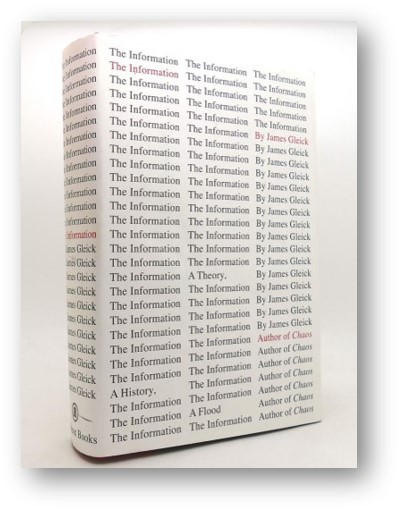
Foundations of Information Science
What is information?
Starting today, we will begin with videos for you to watch. On some weeks, there will be one video to watch. On some weeks, there will be more than one to watch. This week, we have two to watch.
You will get more out of the lectures if you've watched the video(s) ahead of time, but the lectures are not summarizations of the video(s), and many concepts will only be introduced in the lectures.
This first one, by a person named Dolors Jou Torras (described as a "physicist/mathematician/philosopher"), is a wide ranging philosophical consideration of our topic.
The second is a discussion with James Gleick, the author of a required reading for today.
One reading, three concepts
Remember, the lectures will not necessarily be a review of the readings. You need to read it yourself.
You will get more out of the lectures if you've done the reading ahead of time, but, again, the lectures are not summarizations of the readings, and many concepts will only be introduced in the lectures.

Gleick, J. (2011).
The information: A history, a theory, a flood.
New York, NY: Pantheon Books.
From the New York Times:
... a sweeping survey that covers the five millenniums of humanity's engagement with information, from the invention of writing in Sumer to the elevation of information to a first principle in the sciences over the last half-century or so. It's a grand narrative if ever there was one ...
Read chapter 7. As you read it, think about:
- p. 213 - the idea that coding is not meant to obscure, but to illuminate
- p. 219 - "information is uncertainty, surprise, difficulty, and entropy"
- p. 224 - the concept of a state
These are not required, but may be of interest if you wish to progress further on your own.
They may, or may not, be mentioned in the lecture.
-
Lester, J., and W. C. Koehler. "Fundamental Concepts of Information."
In Fundamentals of Information Studies, pages 16-25 only. 2nd ed. New York: Neal-Schuman, 2007. -
Marchionini, Gary. "The Many Meanings of Information."
In Information Concepts: From Books to Cyberspace Identities, pages 1-9 only.
Synthesis Lectures on Information Concepts, Retrieval, and Services. Morgan & Claypool, 2010.
Compared to what?
by Les McCann
A few years after the now-renowned Montreux Jazz Festival began, something happened that still reverberates as a moment in history. It was 1969, at a casino on the shores of Lake Geneva. Pianist Les McCann was onstage, and was pulling no punches. The driving groove that "Compared to What" fell into that night was unlikely because Les McCann's Trio — piano, drummer and bass player — became a quintet with Eddie Harris on saxophone and Benny Bailey on trumpet. They'd never played together before. They hadn't even rehearsed. But from the beginning it just felt right. Richard Nixon was in the White House and opposition to the Vietnam War was about to heat up. Eugene McDaniel's lyrics cover that, but a whole lot more. McCann belted them out in a raspy rant.
The tape that rolled and caught the audio in Montreux that day in June captured an excitement, an electricity, and an unmistakable spirit. It became the hit album: Swiss Movement. The lead track “Compared to What,” lived on, and still lives, in hundreds of jazz and pop versions.